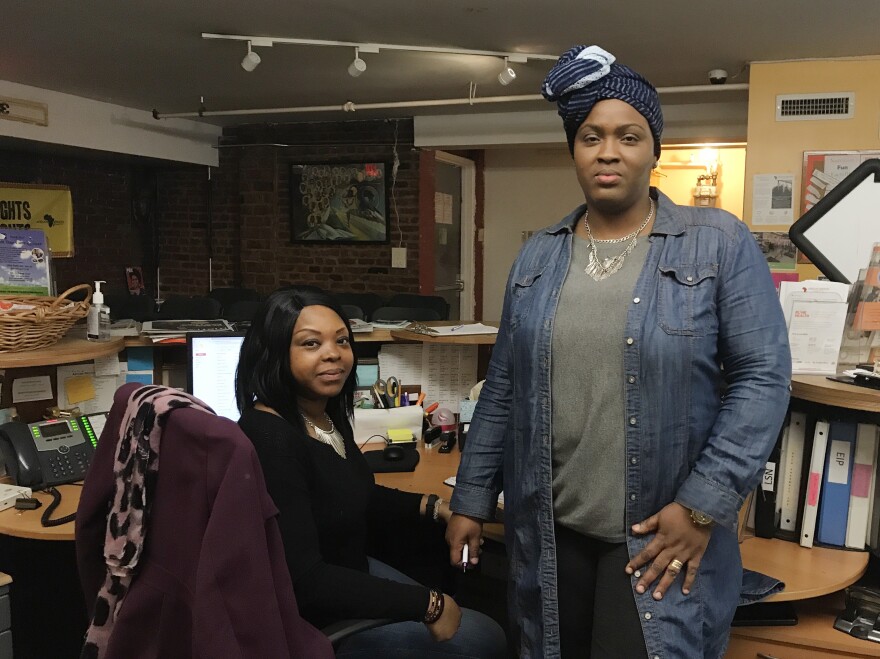For the 2020 census, the U.S. Census Bureau is changing how it will ask black people to designate their race. Under the check box for "Black or African American," the bureau is adding a new space on the census questionnaire for participants to write in their non-Hispanic origins, according to a recent memo from the head of the 2020 census. "African American," "Jamaican" and "Nigerian" are listed as examples of origins on a questionnaire the bureau is testing for 2020.
The change means many black people in the U.S. may have to take a closer look at their family trees to answer what can be a thorny question: Where are you really from? While many black immigrants can cite ties to a specific country, that question is difficult, if not impossible, for many U.S.-born African-Americans to answer.
The bureau has not responded to NPR's questions about why it is making this change to both the "Black" category and the "White" category," which will also include a new write-in area for origins.
But researchers at the bureau have said they have been trying to respond to requests for "more detailed, disaggregated data for our diverse American experiences as German, Mexican, Korean, Jamaican, and myriad other identities." (The bureau was considering an overhaul to all racial categories that would have added check boxes for the largest ethnic groups and a write-in area for smaller groups. But it would require the Trump administration's approval of an Obama-era proposal to change the federal standards on race and ethnicity data, which census experts say the White House's Office of Management and Budget is not likely to move forward.)
"Black from everywhere"
For Niat Amare, the write-in area will allow her to be more specific about her black identity.
"I'm African. I identify as black. But I don't see myself as an African-American," says Amare, who was born in Ethiopia and now lives in New York City. "We can't just be black as African-Americans. We are black from Africa. We are black from the Caribbean. We're black from everywhere."
You can hear some of that diversity among the African diaspora at African Services Committee, where Amare works as a legal advocate for immigrants in New York City.

Soninke, Mandingo, Wolof, Malenke, Pulaar, Amharic, Tigrinya – they're all spoken by staff members at this Harlem-based, nonprofit organization, where French is "the common language in the office," according to Amanda Lugg, the director of advocacy for people living with HIV.
Lugg says more detailed census data about black people's ancestry could improve the public health work at her organization, which offers free health screenings to immigrants.
"This is a great step forward in terms of being able to get more specific information on who's actually living here," says Lugg, who identifies as black British.
"This keeps me up at night"
Mulusew Bekele, the director of program operations at African Services Commitee, says asking for people's origins on the census is likely to run into a major hurdle: Around the country, there's growing distrust in turning over personal information to the government.
"Are people willing to answer that question given the current anti-immigrant sentiment? That I can't tell," says Bekele, who is Ethiopian-American.
It's a concern shared by Christina Greer, a political science professor at Fordham University, who wrote Black Ethnics: Race, Immigration and the Pursuit of the American Dream.
"This keeps me up at night because it's not just about filling out the census," she says.
Greer warns that if fewer black people participate in the upcoming census, there could be an undercount that would have impacts lasting long after 2020, including on redistributing seats in the House of Representatives and drawing up legislative districts.

"Where are you from from?"
Still, Greer says she's planning to write down "Black American" for her origins.
"I consider myself a 'J.B.,' which is 'just black,' " she says. "When people ask you where you're from, and I say, 'Oh, you know, New York, Philly, Chicago, Baltimore,' it's like, 'No, but where are you from from?' "
Many African-Americans who have roots in the U.S. going back centuries to ancestors forced upon these shores as enslaved people cannot answer that question.
"If we're really honest with what hundreds of years of U.S. chattel slavery really meant," Greer says, "many people had to walk miles and across countries before they were shipped off."
Sticking with "American"
The enslavement of hundreds of thousands of African people in the U.S. cut ties to home countries for their descendants, including Chris Owens, a project engineer for an energy consulting firm based in New York City.
Raised in St. Louis, Owens says for most of his life, questions about his race were straightforward.
"Either you're black or you're white, at least where I'm from," he says.
But after moving to Boston and later New York, he says he has been asked whether he is of Haitian or Jamaican descent.
"That's even caused me to try to figure out which island I was from," Owens says.
He has just over two years to keep digging into family history for an answer before the 2020 census forms come out. For now, though, if you ask him about his origins, he says he's sticking with "American."
Copyright 2022 NPR. To see more, visit https://www.npr.org.


